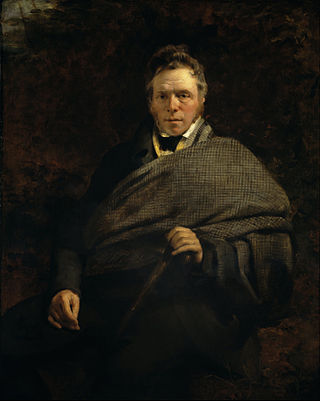Related Research Articles

The Yarrow Water is a river in the Borders in the south east of Scotland. It is a tributary of the Ettrick Water and renowned for its high quality trout and salmon fishing. The name "Yarrow" may derive from the Celtic word garw meaning "rough" or possibly share a derivation with the English name "Jarrow".

Archibald David Constable was a Scottish publisher, bookseller and stationer.

James Hogg was a Scottish poet, novelist and essayist who wrote in both Scots and English. As a young man he worked as a shepherd and farmhand, and was largely self-educated through reading. He was a friend of many of the great writers of his day, including Sir Walter Scott, of whom he later wrote an unauthorised biography. He became widely known as the "Ettrick Shepherd", a nickname under which some of his works were published, and the character name he was given in the widely read series Noctes Ambrosianae, published in Blackwood's Magazine. He is best known today for his novel The Private Memoirs and Confessions of a Justified Sinner. His other works include the long poem The Queen's Wake (1813), his collection of songs Jacobite Relics (1819), and his two novels The Three Perils of Man (1822), and The Three Perils of Woman (1823).
William Laidlaw (1780–1845) was a Scottish poet. The son of a border farmer, he became steward and amanuensis to Walter Scott, and was the author of a well-known ballad, Lucy's Flittin.
Alexander Bald was a Scottish poet.

The Lively class were a successful class of sixteen British Royal Navy 38-gun sailing frigates.
Edmund John Eyre (1767–1816), was an English actor and dramatist.
John Grieve, was a Scottish poet.
Remembrancer (1800–1829) was a British Thoroughbred racehorse and sire best known for winning the classic St Leger Stakes in 1803. Bred and trained in County Durham, he was still unnamed when winning six races including the St Leger and the Doncaster Cup as a three-year-old, and was undefeated in four starts in 1804, including a division of the Great Subscription Purse at York Racecourse. He remained in training as a five-year-old, but had injury problems and failed to win. At stud, he was moderately successful as a sire of racehorses, but had a lasting impact on the breed through the success of his daughters as broodmares.
Thomas Mounsey Cunningham (1776–1834) was a Scottish poet.
The Queen's Wake is a narrative poem by James Hogg, first published in 1813. It consists of an Introduction, three Nights, and a Conclusion, totalling over five thousand lines, and there are also authorial notes. The poem presents the contributions, in various metres, of a series of Scottish bards to a competition organised by Mary, Queen of Scots on her arrival in Scotland from France in 1561.

William Stark was an influential Scottish architect and town planner. He suffered from poor health and died relatively young, but his proposals for the development of Edinburgh's Eastern, or Third, New Town were faithfully carried on by his pupil William Henry Playfair, who later designed many of Edinburgh's neoclassical landmarks.
The Mountain Bard (1807), containing 21 poems, was James Hogg's first substantial poetical publication.
Songs, By the Ettrick Shepherd is a collection of 113 songs by James Hogg published in 1831. All except one of the songs had previously appeared in print, mostly either in Hogg's earlier publications or in a range of periodicals.
A Queer Book (1832) is a collections of 26 poems, mostly short narratives, by James Hogg, all but two of which had been previously published, more than half of them in Blackwood's Edinburgh Magazine.
Altrive Tales (1832) by James Hogg is the only volume to have been published of a projected twelve-volume set with that title bringing together his collected prose fiction. It consists of an updated autobiographical memoir, a new novella, and two reprinted short stories.
Scottish Pastorals (1801), containing five poems and two songs, was the first book published by James Hogg.
Princess Amelia was launched in 1798 at Liverpool. She made eight complete voyages as a Liverpool-based slave ship in the triangular trade in enslaved people. After the end of British participation in the Trans-Atlantic slave trade, she became a merchantman. She was probably the Princess Amelia, from Liverpool, that was lost in 1810.
References
- ↑ Gillian Hughes, James Hogg: A Life (Edinburgh, 2007), 89.
- ↑ Of the 15 pieces by Cunningham at least 14 had also appeared in The Scots Magazine: James Hogg, The Forest Minstrel, ed. P. D. Garside and Richard D. Jackson (Edinburgh, 2006), xlii.
- ↑ Hughes, op. cit., 90.
- ↑ Garside and Jackson, op. cit., xlvii.
- ↑ Garside and Jackson, op. cit., Notes, passim.
- ↑ The Scots Magazine, 72 (1810), 604‒09.
- ↑ The Critical Review, 3rd series, 22 (1811), 139‒44.